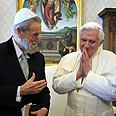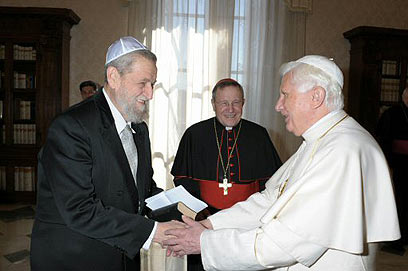
Less than two months after the Vatican's decision to lift the excommunication against Holocaust-denier Bishop Richard Williamson inflamed tensions between Jews and the Church, a group of prominent rabbis met on Thursday with Pope Benedict XVI to mend the fragile relationship between the two religions.
The delegation of representatives sent on behalf of the Chief Rabbinate traveled to Rome after some in the Rabbinate had already threatened to sever ties with the Church following the incident.
Ynet has learned that the pope was not originally scheduled to participate in the meeting, which had been set several months ago and intended to include other Vatican officials. However given the recent tensions, the pope decided to attend.
"We thank the Holy See for making this renewal possible by the clear and unequivocal statements deploring Holocaust denial," Shear-Yashuv Cohen, the Chief Rabbi of Haifa, said in a statement after his audience with the pope.
At a subsequent press conference Cohen said that meeting the pope "has been a very special experience, marking the end of a crisis."

Rabbi Shear-Yeshuv Cohen meets with Pope Benedict XVI (Photo: AFP)
The meeting "marks a positive turning point in the renewal of the dialogue between us," he said. "We couldn't expect more" from Benedict, he added.
The pope, for his part, said: "Because we recognize a common rich spiritual patrimony, a dialogue based on mutual understanding and respect is ... necessary and possible."
Benedict on February 12 said while meeting with leaders of the Conference of American Jewish Organizations that it was "intolerable" to deny the Holocaust.
"Any denial or minimization of this terrible crime is intolerable and altogether unacceptable," he said.
The 81-year-old pontiff, who is to visit Israel and the Palestinian territories in May, wrote in a letter to Catholic bishops published Thursday that he regretted "mistakes" in the handling of the Williamson affair.
The pope suggested that the Vatican was unaware of Williamson's claims that no Jews were killed in Nazi gas chambers, and should have consulted the Internet before deciding to lift his excommunication.
The pope "implied to us that perhaps the steps that were taken (in the Williamson affair) would have been different if the information (about Williamson) had been known," Cohen confirmed.
In his letter to the bishops the pope "has been very clear," he added.
'Damage could have been avoided'
The rabbinate's top advisor on interfaith relations, Rabbi David Rosen, who is currently in Rome as part of the Israeli delegation, spoke to Ynet on Thursday: "The meeting went well. If the clarifications had come sooner we could have avoided a lot of sorrow and damage. In any event we bless and welcome the mending of relations."
Rosen pointed to the Vatican's handling of the media crisis as the main culprit, and stressed that although the remission of the excommunication stands, Bishop Williamson has not been reinstated to his position in the Church and will not be until he accepts the Vatican's position that "anti-Semitism is a sin against God and man."
This is the eighth consecutive year that the rabbinate's committee on dialogue with the Vatican meets with the Vatican's Commission for Religious Relations with the Jews. The committees were established thanks to the initiative of Pope John Paul II, who made the proposal during his historic visit to Israel in 2000.
Rabbi Rosen said that objective of the annual meetings was to "strengthen the ties of friendship and understanding between Catholic and Jewish leaders" on matter such as human rights, the war on terror, abortions, state and religion, birth control, euthanasia, and more. The two sides are not always in agreement.
"There are always differences of opinion, because these are two different religions," Rosen said, "but at the end of each meeting we issue a joint statement on the positions we both share."
AFP contributed to this report















